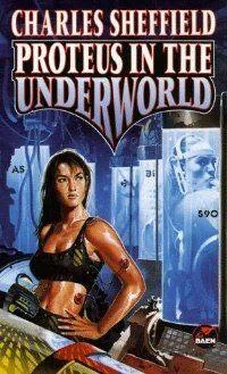Charles Sheffield - Proteus in the Underworld
Здесь есть возможность читать онлайн «Charles Sheffield - Proteus in the Underworld» весь текст электронной книги совершенно бесплатно (целиком полную версию без сокращений). В некоторых случаях можно слушать аудио, скачать через торрент в формате fb2 и присутствует краткое содержание. Год выпуска: 1995, ISBN: 1995, Издательство: Baen Books, Жанр: Фантастика и фэнтези, на английском языке. Описание произведения, (предисловие) а так же отзывы посетителей доступны на портале библиотеки ЛибКат.
- Название:Proteus in the Underworld
- Автор:
- Издательство:Baen Books
- Жанр:
- Год:1995
- ISBN:0-671-87659-7
- Рейтинг книги:3 / 5. Голосов: 1
-
Избранное:Добавить в избранное
- Отзывы:
-
Ваша оценка:
- 60
- 1
- 2
- 3
- 4
- 5
Proteus in the Underworld: краткое содержание, описание и аннотация
Предлагаем к чтению аннотацию, описание, краткое содержание или предисловие (зависит от того, что написал сам автор книги «Proteus in the Underworld»). Если вы не нашли необходимую информацию о книге — напишите в комментариях, мы постараемся отыскать её.
Proteus in the Underworld — читать онлайн бесплатно полную книгу (весь текст) целиком
Ниже представлен текст книги, разбитый по страницам. Система сохранения места последней прочитанной страницы, позволяет с удобством читать онлайн бесплатно книгу «Proteus in the Underworld», без необходимости каждый раз заново искать на чём Вы остановились. Поставьте закладку, и сможете в любой момент перейти на страницу, на которой закончили чтение.
Интервал:
Закладка:
He moved to the dim-lit escalator and stared down its segmented spiral. It was working, exactly as usual. Either the maintenance work was all finished, or possibly it had not yet begun.
He stepped onto the broad, shelf-like top step, and was carried smoothly downward. Five hundred meters to go, at maybe five meters a second. Almost two minutes of descent, with nothing but blank walls and the spiral above and below to look at.
Bey stared at his feet. Each step was made of some plates of lightweight plastic honeycomb. He could see through the wide-spaced square grille of the white plastic to a similar step ten meters below, and imagine that he could see through that, to another and still lower step, until every space in the grille at his feet was filled by some part of a step beneath. Olbers’ Paradox, escalator version: Why is the sky dark at night? Answer: In this case, it isn’t. He could see nothing below but white steps.
What was far more difficult to understand was just how successive plates of the escalator were linked, and it was harder yet to comprehend what happened at the bottom, where the steps must somehow turn around and ascend again to the top of their segment. He tried to visualize a double spiral, simultaneously descending and ascending. An unfolding double helix. Escalator DNA; continuously unraveling.
Bey was not so much thinking as drifting, passing the time in idle and random association until this piece of his journey was over and he could get on to the next one. When the unrelieved pattern of white at his feet was broken to become a fine grid of black, it did not alarm him. It did not even particularly interest him. It meant only that the escalator ride was almost over, and would soon discharge him onto the hard black surface of the tunnel to Melford Castle.
But some piece of his mind, far beneath conscious level, must have been keeping an exact count of escalator segments. He suddenly knew they should not yet be at the bottom- certainly not within one turn of the helix.
He stared hard at the step he was standing on. The dark beyond the grille was more prominent, as though some other step beneath it was no longer there. That was impossible. Unless he had miscounted and they were approaching the bottom. Or unless …
Bey looked, not down but along the stepped spiral of steps ahead. He could see eight steps, stretching away to form a full hundred and eighty degrees of turning descent. For a moment he was reassured—until, as he watched, the most distant step below him vanished.
In its place stood nothing. Not another and different color of step, not the approaching floor of the tunnel. Nothing. Except that as he looked, he saw a faint, far-off light. That had to be the tunnel, its wall lights at least twenty meters below him-the height of a tall building.
As he watched, another step vanished from sight. It must somehow be curving back under the escalator and re-ascending. But who cared where it went, or how? The gulf in front of Bey was closer. The escalator was still moving steadily down. There were only six more steps ahead. After that the one beneath his feet would disappear in its turn. He would drop, fifteen meters to a stone-hard floor. Ten meters were often enough to kill a man.
He turned and began to run back up the turning staircase of the escalator. After ten steps he risked a glance behind. It was still six steps to the edge. He could keep up with the escalator-just, in a true Red Queen’s Race, running as fast as he could to stay in the same place.
But for how long? He had seen no halfway point where he could escape from the escalator. The only way he could reach safety was to run all the way back up to the top: half a kilometer, vertically, while the descending escalator steadily nullified his upward progress. Bey knew that was far beyond his physical powers, probably beyond the endurance of the best athlete in the system.
He was already panting for breath. The thinner air of the Mars interior atmosphere offered him less oxygen. Muscle fatigue provided the growing pain of lactic acid build-up in his calves and thighs. His efforts had bought him a couple of minutes of thinking time, but at a price. Even with the reduced Martian gravity, another thirty seconds would put additional exertions beyond him.
Bey spun around again to face the descending steps. When the one he was standing on vanished he would face a fifteen-meter drop. Lie flat until the last moment and then hang at arms-length, and it would become a bit less than thirteen meters. A thirteen meter drop on Mars. What did that equate to on Earth?
Aybee could have told him the answer in a fraction of a second. Unfortunately, Aybee was a few tens of billions of kilometers away. Bey was on his own. Mars surface gravity, about forty percent of Earth’s. Terminal velocity for a given distance of fall proportional to the square root of acceleration. So thirteen meters on Mars was like thirteen times the square root of 0.4 on Earth; say, thirteen times—No time. And no choice, even if he didn’t like the answer.
Bey was again facing up the escalator, his feet placed on the step below. When he felt it vanish beneath them he gripped the leading edge of the step above him. The one his knees rested on would be gone soon, in another second or so. He had to hang on until the step he held reached its lowest point before turning to ascend. Then it all happened while he was still thinking it through. His hands released as soon as he felt the edge of the step begin to turn. And then he was falling.
The lower Mars gravity offered one other small advantage. The duration of his fall was longer. He could orient his body upright, bend his knees slightly, and hope to land and roll.
Bey did everything perfectly. His reward was a sharp cracking sound as he hit. He felt a horrible shooting pain in his left ankle, followed immediately by the equal agony of a breaking left arm and ribs as his body rolled into the hard floor of the tunnel.
He lay still, the left side of his face flat against the smooth surface. He could feel cold sweat bursting out all over his body. He had the answer now to his question, how far was a thirteen-meter fall on Mars? It was too far, too much for human flesh and bone. He felt as though any form of movement would kill him.
But he knew that no form of movement would also kill him. The tunnel, one kilometer down, was balmy compared with the surface of Mars, but it was still at freezing-point. Heat was seeping out of his body into the cold tunnel floor. A few hours of that and he would be dead, regardless of his injuries.
He lifted his head and stared a worms-eye view along the cold, black floor. The chance that someone would conveniently wander along the tunnel to save him was flat zero. He would be almost as well off waiting for a savior out on the barren surface. If he didn’t do it, no one else would. He had to make his way to the little cars that ran to and from the entrance to Melford Castle. He had to lift himself into one. And somehow, at the other end, he had to lift himself out.
There was just one problem. He couldn’t do it. By pushing with his right leg and pulling with his right arm, he could advance a painful few feet along the tunnel before he had to rest. The car he needed was over a hundred meters away.
Think of the alternative. Bey made another great effort and dragged himself a little farther. A hundred meters was nothing but two meters, repeated fifty times. You moved, and you moved again. Or you died. The square root of 0.4 was close to 0.6. And 0.6 times thirteen meters—Bey pushed and pulled and inched forward- that was less than eight meters. Trained acrobats on Earth could take a fall of eight meters and not think twice about it. Which only proved—pull and push and move—what you already knew, that you were not a trained acrobat.
Читать дальшеИнтервал:
Закладка:
Похожие книги на «Proteus in the Underworld»
Представляем Вашему вниманию похожие книги на «Proteus in the Underworld» списком для выбора. Мы отобрали схожую по названию и смыслу литературу в надежде предоставить читателям больше вариантов отыскать новые, интересные, ещё непрочитанные произведения.
Обсуждение, отзывы о книге «Proteus in the Underworld» и просто собственные мнения читателей. Оставьте ваши комментарии, напишите, что Вы думаете о произведении, его смысле или главных героях. Укажите что конкретно понравилось, а что нет, и почему Вы так считаете.












